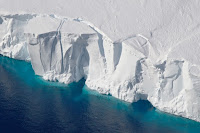
Study finds even the tallest ice cliffs should support their own weight rather than collapsing catastrophically
When these ice shelves collapse into the ocean, they expose towering cliffs of ice along Antarctica’s edge.
Scientists have assumed that ice cliffs taller than 90 meters (about the height of the Statue of Liberty) would rapidly collapse under their own weight, contributing to more than 6 feet of sea-level rise by the end of the century — enough to completely flood Boston and other coastal cities. But now MIT researchers have found that this particular prediction may be overestimated.
In a paper published today in Geophysical Research Letters, the team reports that in order for a 90-meter ice cliff to collapse entirely, the ice shelves supporting the cliff would have to break apart extremely quickly, within a matter of hours — a rate of ice loss that has not been observed in the modern record.
“Ice shelves are about a kilometer thick, and some are the size of Texas,” says MIT graduate student Fiona Clerc. “To get into catastrophic failures of really tall ice cliffs, you would have to remove these ice shelves within hours, which seems unlikely no matter what the climate-change scenario.”
If a supporting ice shelf were to melt away over a longer period of days or weeks, rather than hours, the researchers found that the remaining ice cliff wouldn’t suddenly crack and collapse under its own weight, but instead would slowly flow out, like a mountain of cold honey that’s been released from a dam.
“The current worst-case scenario of sea-level rise from Antarctica is based on the idea that cliffs higher than 90 meters would fail catastrophically,” Brent Minchew, assistant professor in MIT’s Department of Earth, Atmospheric and Planetary Sciences. “We’re saying that scenario, based on cliff failure, is probably not going to play out. That’s something of a silver lining. That said, we have to be careful about breathing a sigh of relief. There are plenty of other ways to get rapid sea-level rise.”
Read more at Antarctic Ice Cliffs May Not Contribute to Sea-Level Rise as Much as Predicted
No comments:
Post a Comment